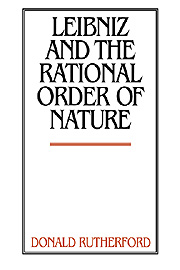Book contents
- Frontmatter
- Contents
- Acknowledgments
- A Note on Citations and Translations
- Abbreviations
- Introduction
- Part I Theodicy
- 1 The Vindication of Divine Justice
- 2 The Maximization of Perfection and Harmony
- 3 Happiness and Virtue in the Best of All Possible Worlds
- Part II First Philosophy
- Part III Nature
- Conclusion
- Bibliography
- Index
3 - Happiness and Virtue in the Best of All Possible Worlds
Published online by Cambridge University Press: 05 June 2012
- Frontmatter
- Contents
- Acknowledgments
- A Note on Citations and Translations
- Abbreviations
- Introduction
- Part I Theodicy
- 1 The Vindication of Divine Justice
- 2 The Maximization of Perfection and Harmony
- 3 Happiness and Virtue in the Best of All Possible Worlds
- Part II First Philosophy
- Part III Nature
- Conclusion
- Bibliography
- Index
Summary
Many of Leibniz's writings represent the creation of rational minds as the culmination of God's plan for the best of all possible worlds. Minds, they suggest, are what God prizes most in the universe – the rest is created merely as a means to their greatest happiness:
I put forward the great principle of metaphysics as well as of morality, that the world is governed by the most perfect intelligence which is possible, which means that one must consider it as a universal monarchy whose head is all-powerful and sovereignly wise, and whose subjects are all minds, that is, subjects capable of relations or society with God; and that all the rest is only the instrument of the glory of God and of the happiness of minds, and that as a result the entire universe is made for minds, such that it can contribute to their happiness as much as possible. (K X 9–10/R 105)
This conception of the universe as “made for” intelligent creatures appears to stand in an uneasy tension with what we have so far identified as the primary end of creation: the maximization of metaphysical goodness or perfection. To the extent that Leibniz champions the latter as the fundamental value realized in creation, he seems to reserve no special place in the world for rational creatures; conversely, to the extent that he represents the perfection of the rest of the universe merely as a means to the greater happiness of minds, he appears to reject the maximization of metaphysical goodness as the primary end of creation.
- Type
- Chapter
- Information
- Leibniz and the Rational Order of Nature , pp. 46 - 68Publisher: Cambridge University PressPrint publication year: 1995



